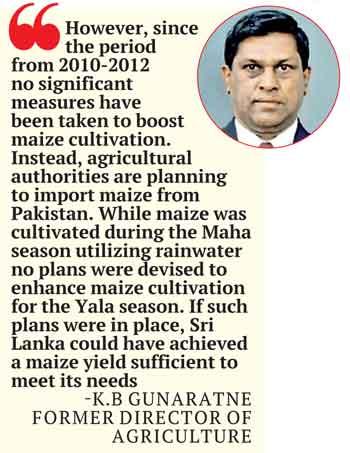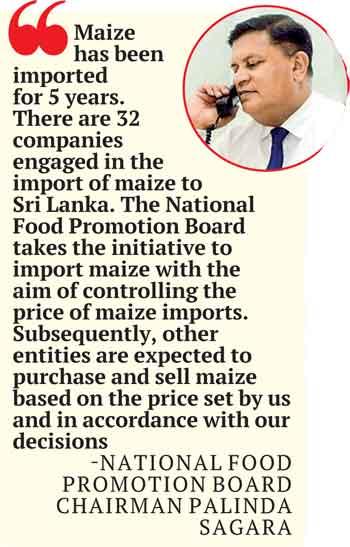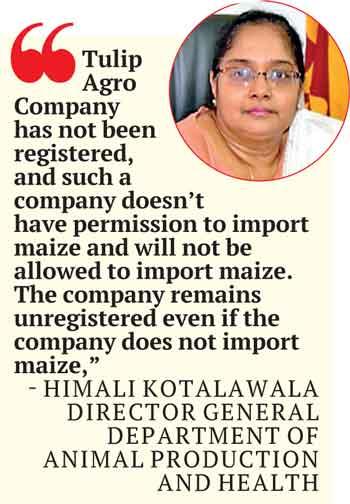12 Oct 2023 - {{hitsCtrl.values.hits}}
 State Minister for Finance Ranjith Siyambalapitiya stated in August that the government had reduced the import tax on a kilogram of maize by 50 rupees. The previous import duty for a kilogram of maize was 75 rupees. Consequently, the import duty on a kilogram of maize has now been lowered to 25 rupees.
State Minister for Finance Ranjith Siyambalapitiya stated in August that the government had reduced the import tax on a kilogram of maize by 50 rupees. The previous import duty for a kilogram of maize was 75 rupees. Consequently, the import duty on a kilogram of maize has now been lowered to 25 rupees.
The government’s decision to reduce the import tax on maize is aimed at lowering the cost of animal feed produced with maize. However, it has been reported that some companies are attempting to capitalise on the tax concessions provided for maize imports to Sri Lanka; which would then potentially generate substantial profits. Consequently, there seems to be plans to distribute the tender for maize importation among multiple companies, without granting the tender to those companies that have been importing maize so far. These plans are driven by expectations of earning higher profits.
 Meanwhile, the Ministry of Agriculture recently made a decision to impose and subsequently lift a ban on maize imports. The Department of Animal Production & Health in Peradeniya (Central Province) decided to import maize due to a shortage of two hundred thousand metric tons. The Department of Animal Production and Health (DAPH) planned to distribute the imported maize; allocating 70 percent to companies that utilise maize in their production and the remaining 30 percent to companies importing it for animal feed. Consequently, companies involved in various products using maize have already commenced importing 70 percent of the designated quantity. The National Food Promotion Board was tasked with importing 10 percent of the remaining 30 percent of maize. Initially, the Ministry of Agriculture had planned and granted permission to allocate the remaining 20 percent to other exporters. However, without providing any explanation, the Ministry halted the import of maize stocks that had been allowed for these exporters. Additionally, there was a sudden ban on maize imports. The day after the ban was enforced permission to import maize was reinstated without any specific reason, according to former Director of Agriculture, K.B. Gunaratne.
Meanwhile, the Ministry of Agriculture recently made a decision to impose and subsequently lift a ban on maize imports. The Department of Animal Production & Health in Peradeniya (Central Province) decided to import maize due to a shortage of two hundred thousand metric tons. The Department of Animal Production and Health (DAPH) planned to distribute the imported maize; allocating 70 percent to companies that utilise maize in their production and the remaining 30 percent to companies importing it for animal feed. Consequently, companies involved in various products using maize have already commenced importing 70 percent of the designated quantity. The National Food Promotion Board was tasked with importing 10 percent of the remaining 30 percent of maize. Initially, the Ministry of Agriculture had planned and granted permission to allocate the remaining 20 percent to other exporters. However, without providing any explanation, the Ministry halted the import of maize stocks that had been allowed for these exporters. Additionally, there was a sudden ban on maize imports. The day after the ban was enforced permission to import maize was reinstated without any specific reason, according to former Director of Agriculture, K.B. Gunaratne.
As a result, 10,000 metric tons of maize has been allocated to the National Food Promotion Board. Gunaratne said that the institution has made the necessary arrangements for the import of maize by following the tender procedure. However, Gunaratne, raised concerns about a potential loss of 50 rupees for the government per kilogram of maize imported from Pakistan; calculated when considering the purchasing price and associated tax concessions. He further said that the loss to the government would amount to 500,000,000 rupees. He questioned the authorities regarding the need behind importing maize despite there being a prediction for a substantial loss. Importing maze under this scheme has been compared with the issues that cropped up regarding the infamous sugar and garlic scams.
SL was once self-sufficiency in maize
About 200,000 metric tons of maize is imported annually regardless of the amount of maize grown and harvested. If maize is cultivated appropriately, it will meet local demand. Despite this, Gunaratne pointed out that it is surprising to become accustomed to the import of maize; which move is linked to various privileges. Sri Lanka last achieved self-sufficiency in  maize in 2010, 2011 and in 2012 under the “Api Wawamu – Rata Nagamu” programme, during which maize imports declined. “However, since the period from 2010-2012 no significant measures have been taken to boost maize cultivation. Instead, agricultural authorities are planning to import maize from Pakistan. While maize was cultivated during the Maha season utilizing rainwater no plans were devised to enhance maize cultivation for the Yala season. If such plans were in place, Sri Lanka could have achieved a maize yield sufficient to meet its needs,” said Guneratne.
maize in 2010, 2011 and in 2012 under the “Api Wawamu – Rata Nagamu” programme, during which maize imports declined. “However, since the period from 2010-2012 no significant measures have been taken to boost maize cultivation. Instead, agricultural authorities are planning to import maize from Pakistan. While maize was cultivated during the Maha season utilizing rainwater no plans were devised to enhance maize cultivation for the Yala season. If such plans were in place, Sri Lanka could have achieved a maize yield sufficient to meet its needs,” said Guneratne.
The import of maize is allowed separately for food manufacturing companies and to be used to produce animal feed. The company that obtains that permission must be registered with the DAPH. It must obtain a number, which is given by the Registrar of the Department.
This number is provided to institutions that properly implement the recommendations specified by the department. However, according to the tender obtained by the National Food Promotion Board (NFPB) for the import of maize this time, the tender has been awarded to a company called Tulip Agro. Arrangements have been made to import the maize. However, the DAPH has not issued a registration number to that company for importing maize. Gunaratne said that without a registration number from the department, it will not be possible to import maize.
This newspaper made inquiries from National Food Promotion Board Chairman Palinda Sagara why a company which is not registered under the DAPH was allowed to import maize. Sagara said, “Maize has been imported for 5 years. There are 32 companies engaged in the import of maize to Sri Lanka. The National Food Promotion Board takes the initiative to import maize with the aim of controlling the price of maize imports. Subsequently, other entities are expected to purchase and sell maize based on the price set by us and in accordance with our decisions.
“This time too, the Department of Animal Production and Health recommended importing two hundred thousand metric tons of maize. Consequently, we were permitted to import 10 percent of this quantity. Following this, we granted the importation of maize to Tulip Agro, a company of the Avant Garde Group. The selection process involved placing a notice in the newspaper and attracting offers from three companies. These three companies were then evaluated by a technical committee, and based on the recommendations of the committee Tulip Agro Company was chosen and officially registered. On receiving approval from the Cabinet and following the recommendations of the President’s Office, this company was legally granted the opportunity to import maize.
“After the Department of Animal Production and Health directly grants us the tender there is no issue as to which company we use to import maize. The company importing maize is not required to register with the Department of Animal Production and Health to obtain a number. This is because we import  maize under a contract with that company,” said Sagara adding that the company’s role is limited to the importation of maize.
maize under a contract with that company,” said Sagara adding that the company’s role is limited to the importation of maize.
This writer also made inquiries from Dr. Nimal Priyankara, Registrar of the Department of Animal Production and Health in Gannoruwa. He had this to say, “We granted permission to the National Food Promotion Board for maize importation. We are not aware of the specific company that will carry out the importation. This aspect doesn’t come under our purview. The Food Promotion Board has issued an invoice to us. We allowed them to import 10,000 metric tons, based on the Ministry of Agriculture’s recommendations. The plan is to import two hundred thousand metric tons this time; with 30 percent allocated to importers and the rest (70 percent) will be imported from companies that make productions using maize. However, there was a recent interruption in the importation of the 30 percent allocated, based on the Ministry’s recommendations. Subsequently, permission was reinstated, but the reasons behind this decision are unknown.
“Also, the company Tulip Agro needs to register with the Department of Animal Production and Health and obtain a number before importing maize. However, we declined to register that company as they did not comply with our recommendations. Consequently, they are not permitted to import maize. I am uncertain about how the Food Promotion Board granted them permission. I am following the instructions given by our Director General and the Ministry of Agriculture,” said Dr. Priyankara.
02 May 2024 49 minute ago
02 May 2024 2 hours ago
02 May 2024 4 hours ago
02 May 2024 6 hours ago
02 May 2024 6 hours ago